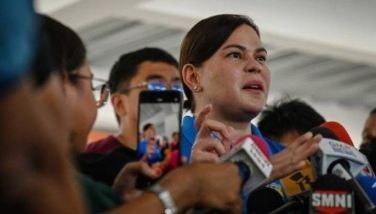Recruiters’ groups clash over ARB issue
October 6, 2002 | 12:00am
Two private organizations have locked horns over the deregulation of the manpower export industry and would likely take their dispute to the court for mandatory arbitration.
The Philippine Overseas Entertainment Industry Foundation (POEI) challenged the Philippine Association of Recruitment Agencies Deploying Artists Inc. (PARADA) to argue its position before the court.
"Charge me in court and I’ll answer everything," POEI president Willie Espiritu said in a statement.
He was reacting to allegations by PARADA that POEI has been conducting training and testing of Filipino entertainers eyeing overseas jobs, as well as issuing certification of competency and Artist Record Book (ARB) without proper authority from the government.
For his part, PARADA chairman Alfredo Palmiery asserted that contrary to POEI’s claim, PARADA "is not opposed to deregulation and is in fact actively involved in present efforts of the private sector to have it implemented."
In his own statement, Palmiery said the deregulation issue has been elevated to the Supreme Court for final resolution.
"The issue now rests with the Supreme Court although a parallel action to have RA (Republic Act) 8042 amended is being undertaken (by) Congress," Palmiery said.
He added that PARADA, in collaboration with other industry groups, has taken steps to ensure that the amendment "would be favorable to the licensed manpower agencies and legitimate industry stakeholders."
"What we are resisting is the move by POEI to arrogate upon itself the functions of the Technical Education and Skills Development Authority (TESDA) to administer skill assessment of singers and dancers applying for overseas jobs and issue them ARBs."
Belying Palmiery’s allegation, Espiritu claimed it was TESDA that has been performing a task that belonged to the private sector.
"It’s the other way around because RA 8042, or the Migrant Workers and Overseas Filipinos Act of 1995, had already stripped both the Department of Labor and Employment (DOLE) and the Philippine Overseas Employment Administration (POEA) of their authority and regulatory functions, respectively, over migration of workers," Espiritu said.
"We have never claimed that we are composed of licensed recruitment agencies and we never said we represent the whole industry players, but we are an NGO (non-government organization) ready to act as government’s partner in the protection of overseas performing artists," he added.
Palmiery maintained, however, that the POEA has issued an advisory saying that the ARB being issued by POEI is not honored by the Japanese Embassy and Immigration authorities.
The Philippine Overseas Entertainment Industry Foundation (POEI) challenged the Philippine Association of Recruitment Agencies Deploying Artists Inc. (PARADA) to argue its position before the court.
"Charge me in court and I’ll answer everything," POEI president Willie Espiritu said in a statement.
He was reacting to allegations by PARADA that POEI has been conducting training and testing of Filipino entertainers eyeing overseas jobs, as well as issuing certification of competency and Artist Record Book (ARB) without proper authority from the government.
For his part, PARADA chairman Alfredo Palmiery asserted that contrary to POEI’s claim, PARADA "is not opposed to deregulation and is in fact actively involved in present efforts of the private sector to have it implemented."
In his own statement, Palmiery said the deregulation issue has been elevated to the Supreme Court for final resolution.
"The issue now rests with the Supreme Court although a parallel action to have RA (Republic Act) 8042 amended is being undertaken (by) Congress," Palmiery said.
He added that PARADA, in collaboration with other industry groups, has taken steps to ensure that the amendment "would be favorable to the licensed manpower agencies and legitimate industry stakeholders."
"What we are resisting is the move by POEI to arrogate upon itself the functions of the Technical Education and Skills Development Authority (TESDA) to administer skill assessment of singers and dancers applying for overseas jobs and issue them ARBs."
Belying Palmiery’s allegation, Espiritu claimed it was TESDA that has been performing a task that belonged to the private sector.
"It’s the other way around because RA 8042, or the Migrant Workers and Overseas Filipinos Act of 1995, had already stripped both the Department of Labor and Employment (DOLE) and the Philippine Overseas Employment Administration (POEA) of their authority and regulatory functions, respectively, over migration of workers," Espiritu said.
"We have never claimed that we are composed of licensed recruitment agencies and we never said we represent the whole industry players, but we are an NGO (non-government organization) ready to act as government’s partner in the protection of overseas performing artists," he added.
Palmiery maintained, however, that the POEA has issued an advisory saying that the ARB being issued by POEI is not honored by the Japanese Embassy and Immigration authorities.
BrandSpace Articles
<
>
- Latest
- Trending
Trending
Latest
Trending
Latest
Recommended
































